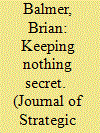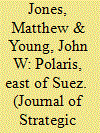| Srl | Item |
| 1 |
ID:
100673


|
|
|
|
|
| Publication |
2010.
|
| Summary/Abstract |
After renouncing an offensive chemical warfare programme in 1956, the UK Cabinet Defence Committee decided in 1963 to re-acquire a chemical warfare retaliatory capability. This article describes how the re-acquisition decision was engendered by a combination of novel research findings, changes in strategic thinking, new intelligence and pressures from NATO. Despite the 1963 decision, no new chemical weapons capability was acquired by the UK and information that Britain lacked a stockpile of chemical weapons was eventually leaked to the public, initiating a fierce debate between ministries over the significance of this leak. This paper argues that non-existent technology is equally problematic for government secrecy, and equally consequential for government action, as what exists. Furthermore, actors' different interpretations of what constituted a secret, point towards a more subtle understanding of secrecy than simply construing it as the hiding or uncovering of items of information.
|
|
|
|
|
|
|
|
|
|
|
|
|
|
|
|
| 2 |
ID:
100671


|
|
|
|
|
| Publication |
2010.
|
| Summary/Abstract |
This article investigates the little-known plans formulated by Harold Wilson's Labour government to deploy Polaris submarines in the Indo-Pacific region. The scheme was first proposed in 1965 as a response to several problems faced by British policy-makers, including China's acquisition of a nuclear capability, Britain's wish to maintain a meaningful position 'East of Suez' at reduced cost, and German pressure for equal treatment within NATO on nuclear matters. Despite extensive high-level discussion, the plans were finally abandoned in mid-1968, as Labour moved more decisively to forsake the world role.
|
|
|
|
|
|
|
|
|
|
|
|
|
|
|
|
| 3 |
ID:
067109


|
|
|